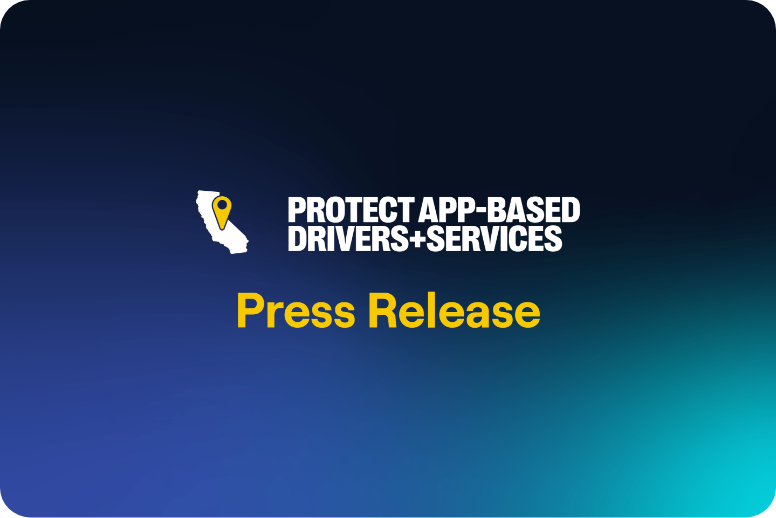“Reclassifying drivers as employees would concentrate employment among a smaller number of drivers and deny many current drivers the opportunity to earn supplemental income”
SACRAMENTO — A new UCLA Anderson Forecast released this week was the latest study to reaffirm the benefits for drivers who drive with app-based rideshare platforms as independent contractors.
The UCLA study is the latest in a long line of academic and economic research highlighting the harms of an employment model and reinforcing the need for Californians to vote Yes on Prop 22 this November.
“Uber and Lyft have substantially increased employment and earnings in the transportation services sector,” said UCLA senior economist Dr. Leo Feler said in the study. “Their low barriers to entry make it comparatively easy for people to become drivers and earn additional income. This additional income helps families smooth economic shocks and sustain consumption during periods of hardship.”
“Reclassifying drivers as employees would concentrate employment among a smaller number of drivers and would deny many current drivers the opportunity to earn supplemental income.”
Some of the study’s notable findings include:
- App-based driving’s flexible business model grew drivers’ net earnings by $4.5 billion. Under an employment model, drivers’ earnings would have grown by 73 percent less.
- Companies like Uber and Lyft brought new transportation jobs to booming cities and smaller towns alike—as a result, app-based rideshare drivers better reflect California’s general population than they would under a traditional employment model.
- Any effort to reclassify drivers as full-time employees might help a select few but would hurt the vast majority.
- The majority of Uber and Lyft drivers drive part-time, have another job, drive occasionally to earn supplemental income, drive for multiple platforms, and need a flexible schedule.
As a result, app-based rideshare and delivery drivers need flexibility in their schedule, which Prop 22 ensures. Further, the study found that app-based driving has been a source of relief for Californians experiencing unemployment, helping to cover expenses and replace lost income. The study reports, “Even before the current recession, when California’s economy was running at 3.9 percent unemployment, its lowest level in decades, the number of people signing up to work for Uber and Lyft as independent contractors kept increasing. This is a revealing fact. It means that even when there are lots of other jobs available, people still want to drive for Uber and Lyft. An employment model would ration these opportunities to those who are able to work full-time and would reduce options for people seeking part-time work and supplemental income.”
After learning of the findings of the study, Elizabeth Clews, an app-based delivery driver, said, “I’m a single mom. I lost my job when the pandemic hit. Then I couldn’t make rent, so I lost my apartment. It’s only because I was able to find work delivering for DoorDash that I was able to earn enough to pay my bills and save for a new place. “That would have been impossible if California forced drivers like me to work as an employee. I might not have gotten the job in the first place, and it would have been nearly impossible to continue job hunting and taking care of my kids while driving full time. I need to be able to continue to provide for my family, and Prop 22 guarantees I can,” continued Clews.
About Proposition 22
An independent study confirms an employment model would eliminate up to 900,000 app-based jobs, a reduction of between 80-90 percent of drivers currently driving today. Without Proposition 22, if an employment model were forced on app-based drivers:
- Rideshare costs would increase for consumers by at least 25.9% and as much as 100% in some markets—meaning that a typical $15 ride across town would cost between $19 and $30;
- Food and grocery delivery costs would increase by at least 35.2% and potentially double in some markets;
- An increase in wait times and a decrease in reliability for customers—meaning an average wait time for rideshare of 7 minutes may double to 14 minutes, and food/grocery delivery of 40 minutes may double to 1 hour and 20 minutes or more; and
- A reduction of the customer base—meaning little or no service to most Californians living in rural or suburban areas of the state.
This will come at the worst possible time, when California is facing high unemployment and when app-based work opportunities will provide a lifeline for people to earn income. In addition, more than 71 percent of app-based drivers want to remain independent contractors, despite efforts by politicians to force them to become employees.
Proposition 22 would ensure driver flexibility, by protecting the ability of California’s one million app-based drivers to choose to work as independent contractors while providing new earning guarantees and benefits. These include:
- Prop 22 improves the quality of app-based work by requiring app-based platforms to provide drivers:
- Guaranteed minimum earnings (120% of California minimum wage), including compensation toward expenses
- Funding for new health benefits for drivers who work at least 15 hours a week
- Occupational accident insurance to cover injuries and illnesses on the job
- Protection against discrimination and sexual harassment
- Prop 22 implements strong new public safety protections:
- Recurring background checks of drivers
- Mandatory new safety courses for drivers
- Zero tolerance for alcohol and drug offenses
- Making it a crime to impersonate a driver
The Latest News

Press Releases
California Supreme Court Unanimously Upholds Prop 22 in Historic Ruling
Date: July 25, 2024 Contact: Molly Weedn, (415) 209-4217 [email protected] California Supreme Court Unanimously Upholds [...] Read more
Press Releases
PADS Responds to Conclusion of Oral Arguments on Prop 22
Date: May 21, 2024 Contact: Molly Weedn, (415) 209-4217 [email protected] The Coalition to Protect App [...] Read more